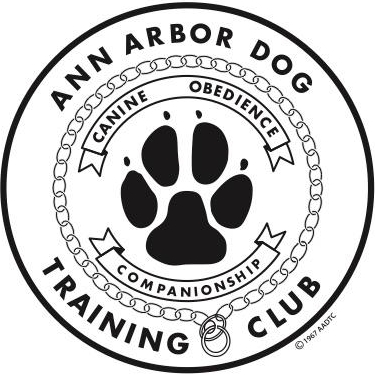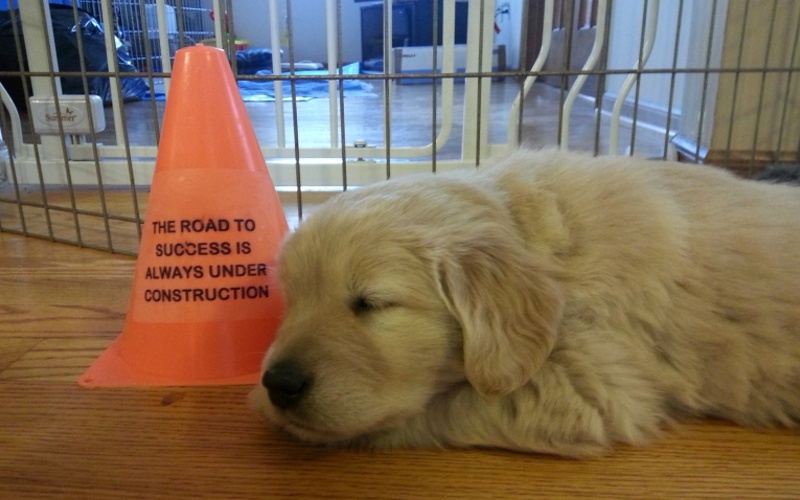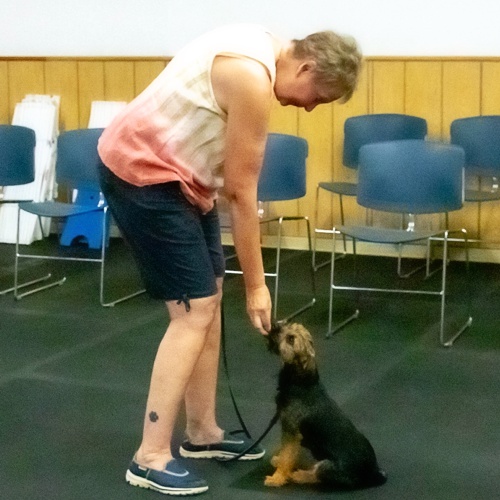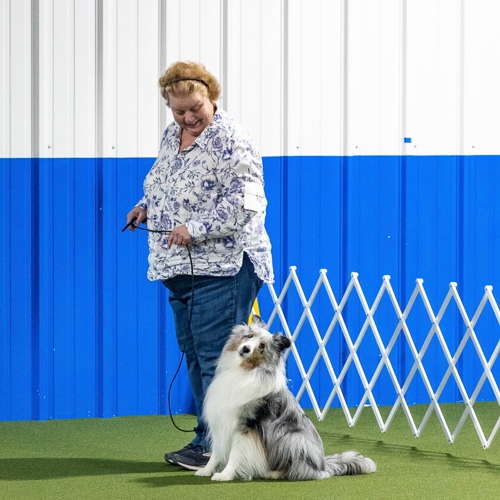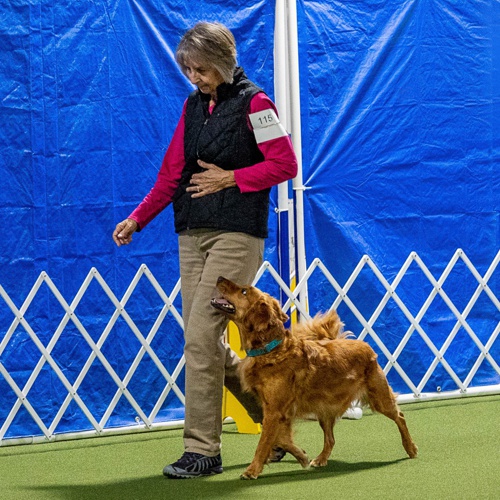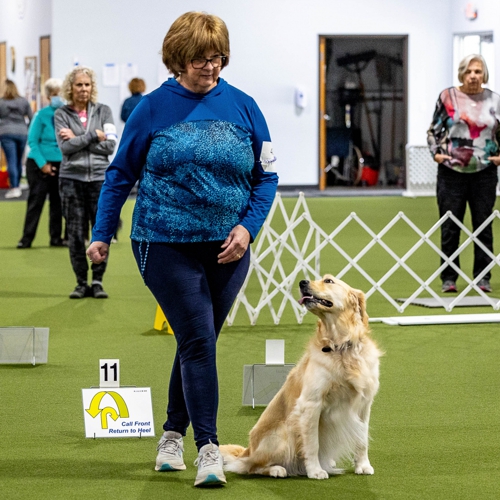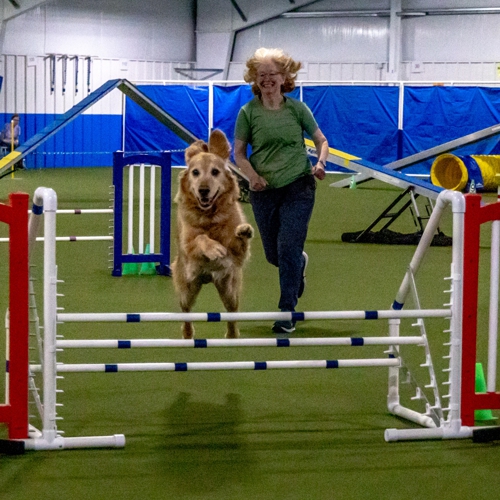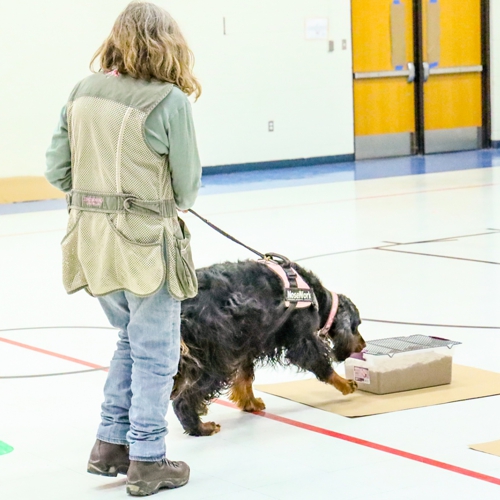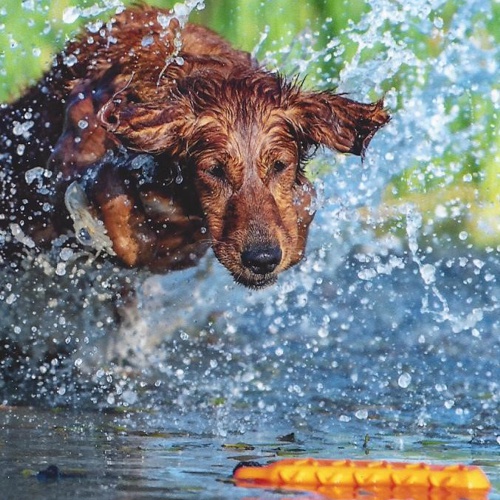Classes
Ann Arbor Dog Training offers a variety of classes in multiple venues including, Puppy, Agility, Obedience, Rally, Scentwork, and Tracking. There are six sessions of classes during the year, but not all classes are offered every session.
Once the next session classes are finalized, our class catalog for upcoming classes will be listed on our catalog website.
If class sessions are underway, the catalog will not list any classes and you can view the current session of classes.
If you are interested in our Registration/Class schedule for a future session, click HERE.
Puppy Classes
Young puppies and adolescent dogs are not yet ready for the rigorous training of advanced classes, but they are very ready to learn basic skills such as sit, down, come and leash-walking. A 10-18 week old Puppy class is offered for 4-weeks each month except December. A 5-12 month Puppy class is also offered each session for the older puppy.
Both of these puppy classes begin to introduce the basic foundation skills that the puppy will need to be a family companion or an agility star.
Prerequisites
-
Puppy must meet the age limit requirements for the Puppy class.
- Puppy must have completed the 2nd series of vaccination shots (generally includes Distemper and Parvovirus, (Bordatella and Leptospirosis based on your vet’s recommendations).
- Proof of Rabies Vaccination not required for this age group
- Must have a negative fecal prior to the start of class and after your puppy was brought home; or if the last fecal was positive, you have documentation that treatment is complete or a letter from your Veterinarian stating that you puppy is safe for class
What To Bring
- Copy of updated vaccination records
- 4-6 ft leash
- Buckle collar; a harness is not a good device for control, especially in a room of puppies, so please do not plan on bringing your puppy in a harness. If you need an exception, then please discuss with the instructor on the first night of class
- Variety of small, easy to eat treats.
Household Obedience
Household Obedience classes are designed to teach basic control (age appropriate) in a variety of situations with distractions. Exercises taught include sit, down, stand, stay, come and controlled walking on a leash. Focus is on household manners to help dog adapt to family life. This class may also include basic problem solving (e.g., chewing, jumping up, etc.). Most classes use food (soft treats) or silent toys in training. This class may be repeated.
Prerequisites
- Dog must be up-to-date on vaccinations and have a recent negative fecal if not in a recent AADTC class.
- Dog should be over 6 months in age.
- No class training prerequisites.
What To Bring
- Copy of vaccination records and have a recent negative fecal if not in a recent AADTC class.
- 4-6 ft leash; buckle collar.
- Variety of small, easy to eat treats.
Obedience
Many begin taking obedience classes as a way to develop better home skills and then become interested in continuing their training. Obedience classes begin to prepare the team for competition obedience, as well as develop a close relationship between the handler and dog. The earlier level classes (Novice I, II, III and Beginner Novice) focus on motivation and attention while learning the basic obedience skills for heeling, sit, down, stand, stay, recall, front and finish. Higher level classes (Open and Utility) focus on more advance skills including retrieving, jumping, signals and scent discrimination. All classes can be repeated until the team becomes more proficient at that level. Not all levels are offered each term.
Class Sequence
Class Levels Progression
- Novice 1
- Novice 2
- Novice 3
- Open
- Utility
- Proofing – at each level
Prerequisites
- Dogs should be over 6 months in age.
- Successful completion of 5-12 Puppy class or Household I equivalent and/or competition-experienced handler.
- Dogs must be up-to-date on vaccinations and have a recent negative fecal if not in a recent AADTC class.
What To Bring
- Copy of vaccination records and have a recent negative fecal if not in a recent AADTC class.
- 4-6 ft leash; buckle collar.
- Variety of small, easy to eat treats.
Rally
Rally is a sport that incorporates obedience-related skills. Rally classes help prepare the handler/dog team to compete competitively in Rally while having fun working on obedience skills at the same time. The handler/dog team follow a set course of rally signs. Each sign indicates a skill that the team needs to perform. Signs might include the skills such as sit, down, change of pace, left or right turns, spiraling around cones, etc.
The maneuvers become increasingly more difficult at the higher Rally levels. Perfection is not expected. More advanced students will be encouraged to try to work off-leash as the higher level Rally levels are off-leash.
Class instruction covers how to perform the various signs/exercises. Visit the American Kennel Club website for a more detailed description of rally and rally course stations.
Prerequisites
- Successful completion of Household I or Novice I equivalent.
- Instructor’s permission.
- The handler/dog team is expected to have the basics of heeling (without leash pulling), fronts, and finishes.
- Dog must be up-to-date on vaccinations.
What To Bring
• Copy of vaccination records.
• 4-6 ft leash.
• Buckle collar.
• Variety of small, easy to eat treats.
• Students should bring a portable crate to use when walking the courses.
Agility
Agility is a fun event for the dog and handler where they execute an obstacle course and try to “beat the clock”. Basic control skills are required before beginning agility training. Dogs will learn to execute increasingly difficult courses comprised of jumps, contacts – A Frame, Dog Walk, Teeter – and Weaves.
Classes are offered at all levels from Introduction to Agility thru the Master and Premier levels of agility.
Class Sequence
Class Levels Progression
- Introduction to Agility
- Foundation 1
- Foundation 2
- Beginning Handling
- Maneuvers
- Novice
- Open
- Excellent/Master
- Specialized Classes
Prerequisites
- Dog over 12 months of age.
- Physically sound and able to run and jump.
- Completion of Obedience Household 1 or equivalent.
- Solid sit stay and/or down stay.
- Solid recall when exposed to distractions.
- Demonstrates ability to walk on a loose leash.
- Willingness to stay in crate without whining or barking.
- If not an Introduction to Agility class, dog must have successfully completed the previous level of agility class or have Instructor permission.
- Up-to-date vaccinations.
What To Bring
- Copy of updated vaccination records
- Crate for dog
- Extra pair of clean shoes to use for training on the turf
- 4-6 ft leash
- Buckle collar; a harness is not a good device for control, especially in a room of puppies, so please do not plan on bringing your puppy in a harness. If you need an exception, then please discuss with the instructor on the first night of class
- Variety of small, easy to eat treats.
Scentwork
Instead of locating drugs or explosives, the dog searches to find different target scents that could be hidden anywhere. Scentwork uses four essential oils – birch, anise, clove and cypress.
Scentwork classes help develop the dog’s desire to use his sense of smell to search/hunt independently. Your dog will learn to recognize and search various areas for his reward both on and off leash. Handlers will learn to read the dog’s behavior and learn to recognize hunting/searching behavior versus behavior when the dog has found the source.
Scentwork classes are offered at all levels from Introduction to Scentwork and up to advanced levels of searching containers, buried scent, exteriors (buildings), interiors (buildings) and vehicles. Scentwork is a wonderful way to build confidence, is great for stimulating your dog’s mind, and is enjoyed by all dogs whether young or old.
Class Sequence
Class Levels Progression
- Scentwork – Introduction 1
- Scentwork – Introduction 2
- Scentwork – Introduction 3 – Odor
- Scentwork – Beginning
- Scentwork – Intermediate
- Scentwork – Advanced
Prerequisites
- Dog over 6 months old.
- Successful completion of 5-12 Puppy, Household I or equivalent.
- If not an Introduction to Scentwork class, successful completion of the previous level class or Instructor approval.
What To Bring
- Copy of vaccination records.
- Buckle collar or harness.
- Variety of soft treats.
- 6 ft leash and 8-12 ft long line.
- Crate for your dog when not working.
Tracking
Tracking is a sport that demonstrates your dog’s natural ability to recognize and follow scent. It is the foundation of canine search and rescue work. In tracking, your dog is completely in charge since only he knows how to find and follow a specific scent. For many, the greatest pleasure of tracking are the hours spent outside, training and interacting with their dogs.
Prerequisites
- No minimum age or previous training needed for Intro to Tracking.
- Up-to-date vaccinations.
- If you dog can tolerate and your vet recommends, it is suggested that your dog have the Leptospirosis vaccinations, as you will be outdoors.
- For higher level tracking classes, successful completion of the previous level or Instructor permission.
What To Bring
- Copy of your vaccination records.
- Buckle collar.
- 4-6 ft leash.
- Variety of small, easy to eat treats.
- Outerwear for you and protection for you dog appropriate for the weather.
Special Classes
Occasionally, AADTC offers classes focused on a particular skill or area. Specialized classes are not offered every term, so you will need to keep an eye on the catalog for class offerings each session.
Some examples of the frequently offered Special Classes include:
Introduction to Field for dogs whose owners are interested in the training for hunt tests. Dog will be introduced to retrieving bumpers and some bird work and blind work will be introduced.
Canine Good Citizen – AADTC frequently offers practices and tests for the AKC Canine Good Citizen (CGC) title. Often a specific class to prepare for the test is offered. The class and the CGC test focus on teaching the basics of good manners and obedience. At the end, if successful in preparation, the dog/handler team should be able to pass a Canine Good Citizen (CGC) test.
Agility Related – A Special class may be offered in Agility and examples would be classes concentrating on a specialized Agility skill such as Weaves or Contacts.
Prerequisites
Prerequisites will vary based on the Specialty class. See class description in class catalog.
What To Bring
What to bring will vary based on the Specialty class so see class description in class catalog.
